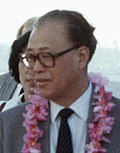| Vice Chairman of the Central Committee of the Chinese Communist Party | |
|---|---|
| 中国共产党中央委员会副主席 | |
 | |
 | |
| Central Committee of the Chinese Communist Party | |
| Style | Vice Chairman (副主席) (informal) Comrade (同志) (formal) |
| Member of | Politburo Standing Committee |
| Reports to | Central Committee |
| Seat | Zhongnanhai, Beijing, China |
| Nominator | Central Committee |
| Appointer | Central Committee |
| Term length | Five years, renewable |
| Constituting instrument | Party Constitution |
| Formation | 26 September 1956 |
| Abolished | 1 September 1982 |
| Vice Chairman of the Central Committee of the Chinese Communist Party | |||||||
|---|---|---|---|---|---|---|---|
| Simplified Chinese | 中国共产党 中央委员会 副主席 | ||||||
| Traditional Chinese | 中國共產黨中央委員會副主席 | ||||||
| |||||||
| Commonly abbreviated as | |||||||
| Chinese | 中共 中央副主席 | ||||||
| |||||||
The vice chairman of the Central Committee of the Chinese Communist Party was the second-highest rank within the Chinese Communist Party (CCP) after the chairman from 1956 to 1982. The position was phased out after 1982 in order to remove the "Chairman" position from any government posting,resigning it solely to the late Mao Zedong.
All vice chairmen were members of the Politburo Standing Committee of the Chinese Communist Party.















